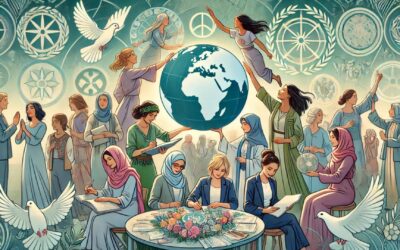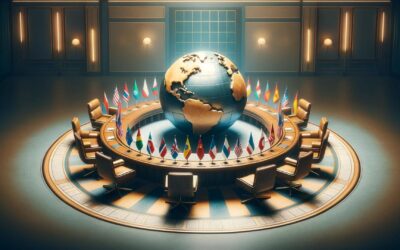The 1990s saw the disintegration of Yugoslavia descend into a horrific series of wars marked by nationalism, ethnic cleansing, and unspeakable atrocities. The Bosnian War, pitting Bosnian Muslims, Croats, and Serbs against one another, was particularly brutal. Cities were besieged, neighbors turned into enemies, and thousands lost their lives.
Yet, from this grim darkness emerged a flicker of hope – the Dayton Accords. More than just a treaty, these accords represent the relentless pursuit of peace in the face of overwhelming bloodshed and seemingly insurmountable odds.
A Turning Point on American Soil
In 1995, under international pressure and U.S. leadership, the warring factions agreed to negotiations at Wright-Patterson Air Force Base in Dayton, Ohio. The talks were far from smooth – weeks of tension, disagreements, and walkouts. But, a collective exhaustion with the brutality, coupled with skilled diplomacy, slowly chipped away at the animosity.
The Compromise
Dayton wasn’t perfect. It created a complex, divided Bosnia, aimed at balancing power between the ethnic groups. Critics point to its concessions to those responsible for war crimes. However, its core achievement stands strong: it stopped the killing. Dayton marked a ceasefire and the start of a long, imperfect, but undeniable path towards peace and co-existence.
Lessons from the Dayton Accords
How did a nation ripped apart begin to heal? The Dayton Accords offer lessons we can still apply to a world rife with conflict:
- Exhaustion is Key: Sometimes a stalemate forces all sides to accept talks are truly the only way forward.
- International Pressure Matters: Outside nations played a crucial role, using trade and the promise of aid to influence leaders.
- Nothing is Easy: Building a lasting peace from such wounds took years of work, peacekeeping forces, and rebuilding trust at all levels of society.
- Imperfect is Better Than the Alternative: Dayton involved real compromises, but the alternative was perpetuating endless suffering.
Relevance in our World Today
Sadly, we don’t have to look far for war, division, and ethnic tensions. Places like Ukraine, Yemen, and others cry out for solutions. Understanding how the Dayton Accords functioned allows us to push for similar interventions – even when the possibility of success seems distant.
Action Point
Beyond knowing the history, how does Dayton impact you? Research organizations involved in active conflict resolution and peacebuilding. Support humanitarian relief in war-torn zones. Let the beacon of Dayton inspire you to advocate, in even small ways, for a world where compromise and reconciliation win over hate and violence.
Why Should You Care?
- Hope in Trying Times: Conflict zones around the world can feel hopeless. The Dayton Accords show that even deeply entrenched wars CAN end, reminding us not to succumb to despair.
- The Complexities of Peace: These accords prove peace-building doesn’t come quickly or easily. Understanding this complexity helps us temper expectations around quick, simple fixes in modern conflicts.
- Tools for Resolution: This event highlights the crucial role of negotiation, diplomacy, and outside pressure in ending wars – concepts vital to supporting peaceful initiatives today.
- Imperfect Steps Matter: Often lasting change hinges on compromises few find satisfactory. Learning from Dayton can aid in evaluating imperfect-but-viable solutions in contemporary situations.
Key Takeaways
- The Bosnian War (1992-1995) was horrific, fueled by nationalism and acts of ethnic cleansing.
- The Dayton Accords of 1995, despite flaws, effectively halted bloodshed and set Bosnia on a path out of war.
- Achieving peace in such a situation took immense international pressure, a grueling negotiation process, and acceptance of complex compromise.
- Rebuilding after such destruction took years, demonstrating that ceasefires are a start, not an end point.
- Dayton serves as both a symbol of the possibility of peace and a sobering reminder of the difficulty in attaining it.
Keywords & Definitions
- Dayton Accords: 1995 Bosnian peace agreement negotiated in Dayton, Ohio.
- Bosnian War: Conflict within Bosnia, a former Yugoslav republic, marked by ethnic violence.
- Yugoslavia: Socialist country fractured in the 1990s with its collapse sparking multiple wars.
- Negotiation: Formal discussion involving different groups aimed at reaching agreement.
- Diplomacy: Managing international relations, often through peaceful negotiations to prevent/end conflict.
- Ethnic Cleansing: Forcible removal of an ethnic group from a territory, a war crime.
- Peace Agreement: Treaty settling war conditions, territory division, etc.
- Conflict Resolution: The techniques and process used in aiding peaceful solutions to a dispute/war.
- Ceasefire: A suspension of active fighting by mutual agreement.
- Peacebuilding: Long-term work after conflict to address root causes and foster reconciliation.
Frequently Asked Questions
- Is Bosnia at peace now? Complex. Ethnic tensions persist, the political system is fractured, BUT large-scale war hasn’t returned. Dayton created a foundation for coexistence, albeit imperfect.
- Who orchestrated the Accords? U.S diplomat Richard Holbrooke played a key role. But ultimately, credit rests with multiple negotiators (European and Balkan), plus a wariness felt by all factions at the time.
- Have war criminals faced justice? Some. International tribunals pursued convictions, but many figures evade punishment, a sore point for victims hindering full reconciliation.
Myth Buster
- Myth: The Dayton Accords created a harmonious multi-ethnic Bosnia.
- Reality: They enshrined ethnic divisions within the government. While ending mass violence, this has proven hard to move past, impacting politics to this day.
Let’s Talk!
- Can a compromise that allows some war criminals to go free ever be truly “just”?
- What do nations owe war-torn zones post-conflict? Is outside aid/guidance essential?
- Should modern countries still study/reference a peace process nearly 30 years old? Why or why not?
Let’s continue the conversation in the comments below!












0 Comments